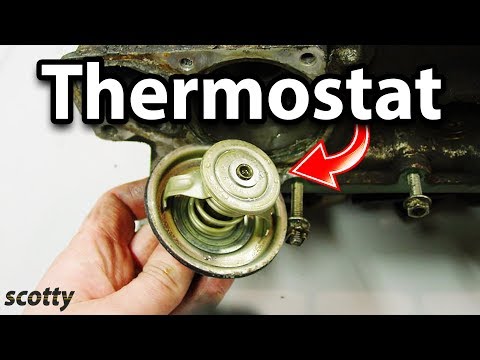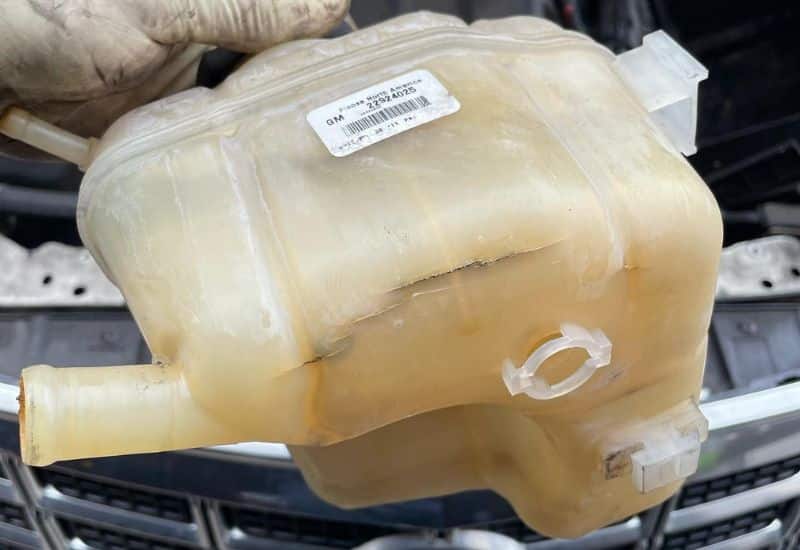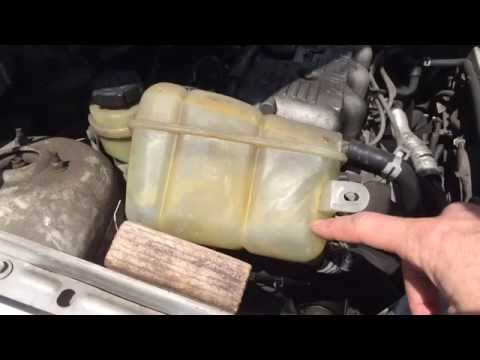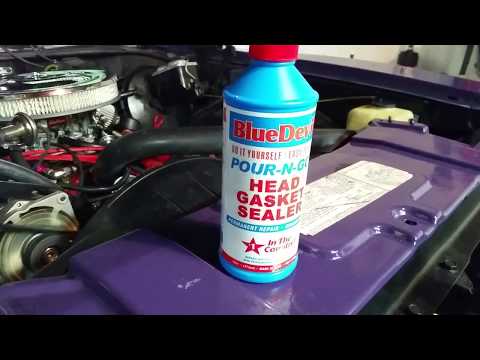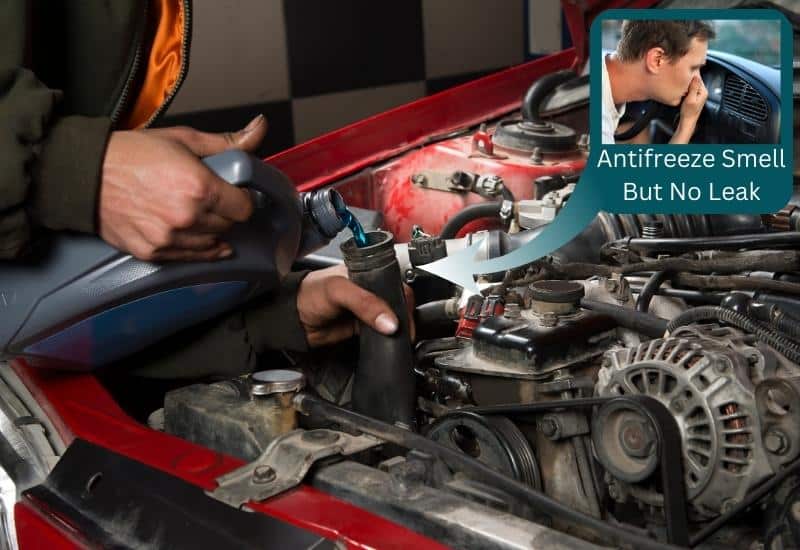
That sweet scent of antifreeze wafting from your car is like a siren’s song of trouble. So, you do the sensible thing – pull over, pop open the hood, and brace yourself for the white steamy puff of an antifreeze leak. But lo and behold, when you lift that bonnet – nothing. Not a single visible leak. Now, that’s a head-scratcher, isn’t it?
Is it a blown head gasket? Could it be a stuck-open thermostat or perhaps a crack in the heater core? These are common and concerning problems that can affect engine performance over time.
Of course, this is a time when it’s probably better to catch an unknown antifreeze leak early than it is to end up stranded on the side of the road with a major cooling system problem and an overheated engine.
To understand why your car smells like antifreeze without showing any obvious leaks, we’ll have to interrogate some of the more likely suspects.
5 Surprising Reasons Your Car Smells Like Antifreeze with No Visible Leaks!
There are a lot of little things that could cause a tiny imperceptible antifreeze leak, as well as a few major problems that can let antifreeze escape into the engine or the exhaust system. Here are the top five probable causes of an antifreeze (coolant) smell in your car, even when no leaks are visible:
1. The Thermostat
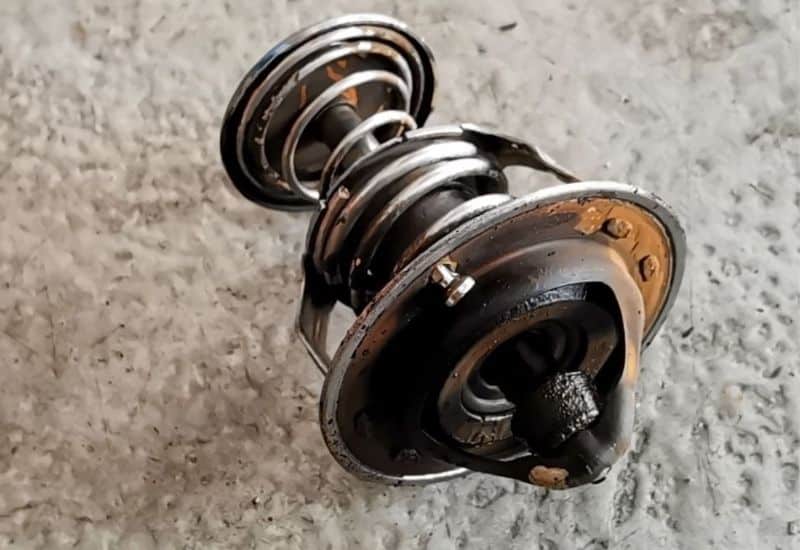
Got a whiff of antifreeze but can’t spot any leaks? A commonly overlooked cause might be a thermostat that’s jammed in the open position. Here’s how it happens: The thermostat in your engine is built to swing open at a certain temperature, allowing the coolant to flow and keep things cool.
Now, if this nifty little device gets stuck in the open position, the coolant can circulate non-stop, regardless of the engine’s temperature. What’s the big deal, you ask? Well, over time, this can gradually wear down the gasket – the peacekeeper that bonds the thermostat housing with the radiator’s crown. Tiny droplets manage to sneak out, then quickly vanish as they sizzle on the hot metal housing. And there you have it – a secret coolant escape act right under your nose!
How to Tell If It’s a Thermostat Leak
A thermostat leak from a stuck-open thermostat or a bad thermostat gasket will often give off faint whiffs of sweet-smelling anti-freeze when you turn the heater on high with the fan set to the max. It will also leave a little white trace residue on the top of the radiator surrounding the thermostat housing.
How to Fix a Thermostat Leak
Replacing the thermostat and the gasket is the easiest way to deal with this type of antifreeze leak.
You can usually get the part for less than $50, and a reasonably capable DIY mechanic can replace the leaking thermostat in less than an hour.
2. Faulty Radiator Cap
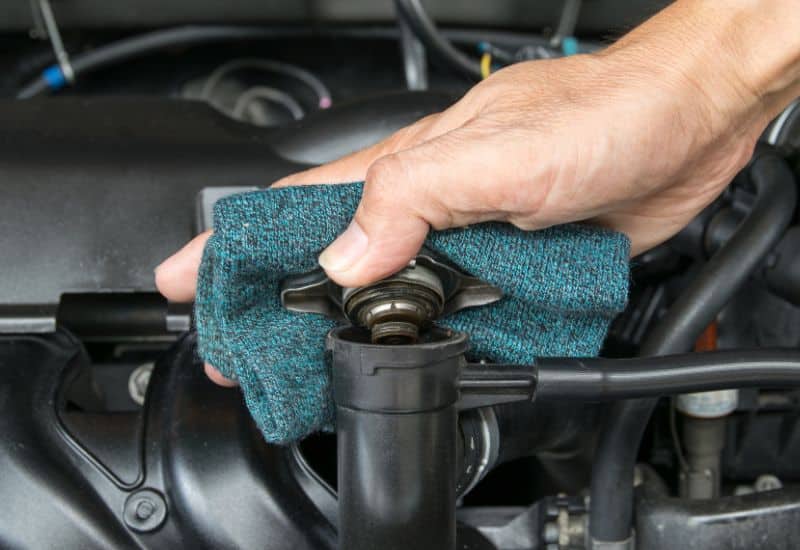
When your car emits an antifreeze odor but displays no visible leaks, the culprit could very well be the radiator cap. This component is designed with a unique valve that helps control pressure when the engine’s cooling system heats up, and the coolant begins to expand. If this valve malfunctions and remains in an open position, it can result in minuscule leaks that evaporate immediately. Additionally, it might release a steam of cooling fluid that hovers beneath the engine compartment. If you activate the cabin heater, the blower fan could even circulate this odor, making the antifreeze smell noticeable.
How to Tell If It’s a Bad Radiator Cap
A bad radiator cap that’s causing coolant vapors or tiny antifreeze leaks will usually have a white residue around the cap and the top of the radiator. You might also notice that the car runs a little hotter than usual and threatens to overheat. You might even see a compressed radiator hose from the imbalance in cooling system pressure.
You’ll need to perform a pressure test with a pressure tester to see if it’s a bad radiator cap. You can usually find one online or buy one at an auto parts store.
How to Fix a Bad Radiator Cap
If a bad radiator cap is the underlying cause of your antifreeze smells, replacing it is the easiest thing to do. This usually costs less than $25, and you can find replacement radiator caps for most makes and models at any auto parts store.
Just ensure that the PSI rating on the replacement cap is exactly the same as the original one that caused your antifreeze leak!
3. The Overflow Reservoir
Overheating and the passage of time can cause a tiny crack in the overflow reservoir. Suppose the crack happens on the backside of the reservoir. In that case, you might not immediately notice the antifreeze leak, especially if the crack happened higher up in the plastic of the reservoir.
An antifreeze leak like this is even harder to detect if the coolant system is low and the engine is relatively cool. Then, when the system heats up again, the reservoir fills a little higher, and the leak becomes more pronounced. Except you’re probably driving down the road and can’t look at it to see the leak.
If you don’t immediately pull over to inspect the reservoir, here’s what happens: as the engine cools down, the low coolant level drops even further, sinking below the crack’s reach. It’s like a vanishing act, leaving you scratching your head.
How to Find a Reservoir Leak
If you suspect a crack or some other type of reservoir leak is the cause of the antifreeze smell, the first thing to do is wipe down every square inch of it with a smooth, dark-colored cloth. The white residue on the cloth is a telltale sign of past antifreeze that leaked and evaporated.
How to Fix a Reservoir Leak
If the crack or leak is minor, you can simply apply some plastic weld. They make some specifically meant to handle the kind of heat and pressure and antifreeze reservoir tank experiences.
Our Product Choice: Versachem 90214 Radiator Repair Kit
If it’s a more serious antifreeze leak, you might have to replace the antifreeze reservoir completely. This is on par with what a capable DIY mechanic can handle, and the part cost is typically less than $50.
4. Leaking Heater Core Lines
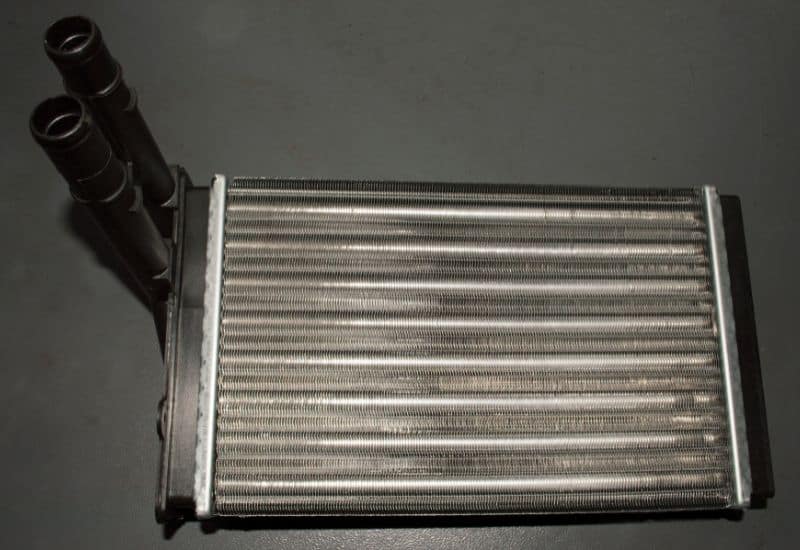
Identifying a leak in the lines that carry hot coolant to the heater core can be challenging, as it may not be readily visible. However, this type of leak tends to produce more potent antifreeze odors inside the cabin compared to the engine bay, particularly when you have the heater turned on with the fan set too high.
How to Tell If It’s an Antifreeze Leak in the Heater Core
If the crack is severe and goes on long enough, you might notice coolant drips in the passenger side footwell or on the passenger side floor vents. Most automakers put the heater core biased toward the passenger side, and the small housing can gradually start to fill with antifreeze.
Even if you don’t see any pools or drips of coolant in the passenger-side vents, an antifreeze leak in the heater core will give off other signs. Over time, you might notice white residue from the antifreeze vapors on your windows. The heater will also perform poorly until it’s almost completely running cold.
As the antifreeze leak progresses and the sweet smell worsens, you’ll probably also notice the engine running increasingly hot. In time, you’ll have low coolant and a very big risk of the car overheating.
How to Fix an Antifreeze Leak in the Heater Core
If it’s just a minor antifreeze leak in your heater core, you might be able to patch it by repurposing some head gasket sealant. You drain the coolant and add it to the coolant reservoir to let it circulate through the system according to the directions on the jug.
Our Product Choice: BlueDevil Products 00209 Head Gasket Sealer
If you’re lucky and the antifreeze leak in the heater core is small enough, it will patch for the next 3 to 6 months. It’s not a permanent fix, but it might be able to get you through the winter and long enough to save up some money for a more permanent repair.
If the antifreeze leak in the heater core is severe, then you’ll likely need a professional mechanic to handle the repair. There’s usually a lot of labor cost involved, and the price can vary wildly depending on if it’s just an antifreeze leak with a line replacement or if the entire heater core needs to be replaced.
On the low end, to just fix the antifreeze leak in the heater core, you’re looking at a bill of around $175 to $250. If the entire heater core also needs to be replaced, the cost goes up from $500 to as much as $750.
5. A Blown Head Gasket
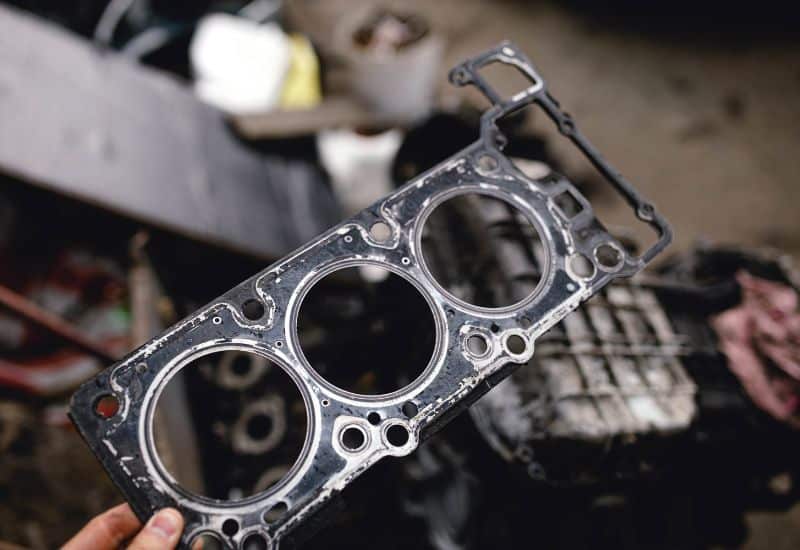
A blown head gasket is the most severe and costly thing that could give off an antifreeze smell into the car’s interior without any visible leaks in the engine bay. This is usually due to a past overheating problem or the cooling system running low on fluid, causing the engine to run overly hot for a prolonged period of time.
All this excess heat in the engine block and cylinder head causes the gasket between the two to degrade. Coolant and possibly some engine oil can get into the cylinders when this happens. This affects engine performance and allows excess coolant to drain down into the exhaust manifold without leaving a single drop of antifreeze in the engine bay!
How to Tell If There’s a Leak in the Head Gasket
You’ll notice some engine performance issues if you’re losing antifreeze due to a blown head gasket. This will usually happen right after an overheating incident. You’ll also notice white smoke in the exhaust, and the engine will run increasingly hot.
If you check the coolant, you might notice it looks dark and dirty. There might even be little droplets of oil mixed in. If you check the oil, you might notice it looks like chocolate milk or has frothy white bubbles in it. These are telltale signs of a blown head gasket or a cracked cylinder head, causing antifreeze and engine oil to contaminate each other.
How to Fix a Blown Head Gasket
If you’re lucky and the leak is minor, you might be able to pour a sealant additive into the coolant reservoir. Just be sure to drain the bad coolant first and follow the directions.
Our Product Choice: BlueDevil Products 00209 Head Gasket Sealer
Though this is only a temporary fix that will last three to six months at most, you’ll need to replace the head gasket completely with a mechanic’s help. If the leak in the head gasket is too severe, no amount of sealant additive will patch it, and the entire head gasket will need to be replaced.
The cost to have a professional mechanic replace your head gasket ranges from $1,500 to $2,500, with parts costing about half of the final bill.
Frequently Asked Questions
Is It Safe to Drive My Car with an Unknown Antifreeze Leak?
If the engine temperature gauge on your dash console reads normal, the antifreeze in the reservoir is clean, and there’s no white smoke coming out of your exhaust, your car might be safe to drive for a few days or weeks. However, the leaking antifreeze will gradually cause the coolant system to run low, eventually overheating the engine. So, every day you go without finding the source of the antifreeze leak increases the risk of suffering a costly engine problem.
Can Antifreeze Vapors Make You Sick?
Most modern-day antifreeze contains ethylene glycol, which doesn’t absorb through the skin. If you have antifreeze vapors in your car’s interior from something like a leak in the heater core, you will likely suffer lung, nose, and eye irritation to the point where you don’t feel well. However, it’s unlikely to reach toxic levels. If you are going to try to drive the car with an antifreeze leak, at least roll the windows down to let the vapors escape and keep the cab air fresh.
Conclusion
The smell of antifreeze in your cab or under the hood, even without any obvious signs of a leak, is a cause for concern. Checking the thermostat, the radiator cap, and the coolant system reservoir will only take minutes and will likely cost you under $100 to fix.
A leak in the heater core with strong smells and drips of antifreeze in the passenger side footwell can be a much more expensive fix. While you might be able to seal it for a few months to get you through the winter, you’re likely looking at an expensive heater core replacement in the future.
Of course, the most serious thing that can cause antifreeze odors without the slightest hint of a leak is a head gasket. However, you’ll likely see contamination in the coolant and the oil. Most head gasket leaks also cause white smoke from the exhaust and abysmal engine performance.

Written By
Jason Farrell
Jason Farrell is a certified master technician, the editor of Mechanic’s Diary in Pittsburgh, Pennsylvania. He is ASE (Automotive Service Excellence) certified and earned a Bachelor’s Degree in Automotive Technology from Pittsburg State University. With nearly 18 prior years of experience in the automotive field, he has extensive knowledge about Domestic, European, and other foreign makes and models of cars and light trucks. Jason’s experience working as a technician and service manager at dealerships, gave him the experience and know-how of most aspects of inspection, diagnosis, and repair from engine and drivability to electrical, HVAC, brakes, steering and suspension and everything in between.

